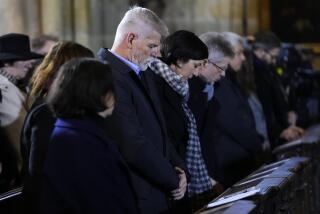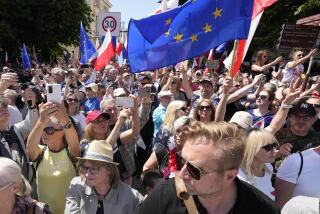Opposition Rally in Prague Marks Human Rights Day
- Share via
PRAGUE, Czechoslovakia — About 5,000 Czechoslovaks on Saturday held the first government-approved opposition rally in nearly 20 years, as a coalition of dissident organizations marked the 40th anniversary of the U.N. declaration on human rights.
“What happened here today happened under the pressure of the citizens, citizens responding and initiating pressure,” the crowd was told by Vaclav Havel, the banned playwright and one of the founding members of Charter 77, the Czechoslovak human rights organization. “Our government has finally realized that it must be more tolerant and cannot react to this pressure with counter-pressure.”
The Czechoslovak authorities, in what dissidents here said was an unprecedented concession, negotiated with the organizations seeking permission for the demonstration and finally allowed it to happen without interference in a small, circular plaza about a mile from Prague’s central Wenceslas Square, where most unsanctioned demonstrations have been carried on in recent months.
Earlier Demonstrations
In August and October, police used tear gas and water cannon to break up demonstrations called by dissident groups in the square.
The hard-line Communist government of Czechoslovakia has taken a tough line with human rights organizations and dissident political groups, frequently detaining well-known activists in advance of planned activities. Dissidents say that about 20 people are imprisoned because of their political activities.
But some dissidents have been unusually optimistic lately, mostly out of the belief that pressure from the Soviet Union is forcing the government to relax its hard-line stance, particularly on rights issues.
Havel, whose appearance at Saturday’s rally brought the crowd’s most enthusiastic response, reflected a growing sense that Czechoslovak authorities are being pressed into change, however reluctantly.
‘Promising Period’
“It seems we are living in a dynamic and promising period,” Havel said. “And our society begins to recover from its long slumber. . . .
“The question is whether the government will take a tolerant attitude to pressure, or whether it will continue the repression. This remains to be seen.
“We hope the government responds to the citizens’ initiatives to be partners in the dialogue. We, too, want to live and work in peace.”
Havel said the organizers believe that Saturday’s march would not have taken place without the “brave partnership” of the people who participated in the demonstrations broken up by police in August and October.
“We think our de facto recognition is a sign of respect not only for the Charter but for the whole of society and public opinion. This is an important step on the way to democracy, civil justice and civil liberty.”
Quickly Dispersed
The peaceful crowd, which appeared to span all age groups, dispersed quickly after the rally, whose hourlong time limit was negotiated between police officials and demonstration organizers.
Some in the rally crowd carried banners bearing the word “freedom.” One called for “Europe Without Political Prisoners.”
Other speakers urged the government to release political prisoners and to free people imprisoned for refusing military service.
Jana Petrova of the Independent Peace Initiative called for a reduction in military service.
“Don’t be afraid of those who want to terrorize us,” she said.
Peter Placak, an organizer of a group of youthful dissidents who have become known as the “Czech Children,” urged the government to “follow the principles embodied in the United Nations declaration on human rights” and warned that “although it seems that there are not so many people in jail these days, the laws apply only to some people, not all.”
The Czechoslovak government, under the auspices of the National Front, an umbrella federation of state-sanctioned organizations, held its own observance of the human rights day earlier Saturday.
More to Read
Sign up for Essential California
The most important California stories and recommendations in your inbox every morning.
You may occasionally receive promotional content from the Los Angeles Times.













